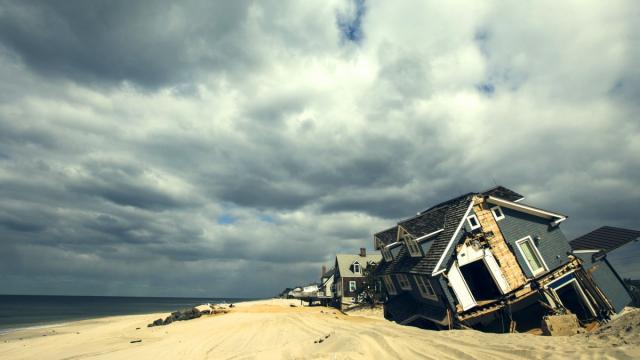
3.5% is all it takes.
“The history of resistance movements shows that when 3.5% of a population gets mobilized on an issue, no government can withstand it,” explains Kevin Zeese, co-director of Popular Resistance, an organization working with System Change not Climate Change and Global Climate Convergence to put on the New York City Climate Convergence Sept. 19-21.
The Global Climate Convergence represents a coming together of activists and organizers from across the country and the globe. The GCC seeks to mobilize some of that 3.5% – or, in fact, even 1% – as numbers as small have proven enough to facilitate real change in the past.
“I think we had one-tenth of 1% with Occupy and look what that did. You get 1% – 3 million people – and you'd have a real scared power structure. It would change the political culture; think of how many more jobs there would be, better transit, better air and water quality. You'd be talking about so much more than just climate.”
That's exactly what the Climate Convergence has on its agenda. Helping to spearhead a range of social-political issues under the unifying banner of "Climate Justice" is Jill Stein – physician, activist and 2012 Green Party presidential nominee, who calls this the “movement of movements.”
“My sense, when I came out of the national campaign in 2012, was that there was a rebellion in full swing and that we really needed to find ways to reign the pieces of that rebellion together," said Stein in a recent conversation.
"A lot of people felt that we had reached the end of the road of single issue activism, and that we badly needed to come together around a unified agenda for justice, peace, and that we needed to build a movement – that we needed to reject the divide and conquer strategy of organizing.”
What started last fall as a Democracy Convention in Madison, WI, put on by Stein and the organization Liberty Tree Foundation, grew into the first Global Climate Convergence that took place in April on Earth Day. Dubbed “Earth Day to May Day,” organizers at the Convergence sought to draw parallels between the climate and labor movements.
The participation and success of that gathering inspired another Convergence – this one to be held on Friday, Saturday and Sunday of this week in New York City, as a “people's response and counterweight to the UN climate process.” Long corrupted by corporate interests and the government policies they shape, the UN – whose representatives will meet next Tuesday, Sept. 23, to discuss emission reduction targets ahead of next year's Paris climate summit – has a history of dealing with climate change by not dealing with it at all.
Mobilizing the Movement of Movements
In response, the Convergence will host a myriad of events and actions taking place across the city, from community gardens to churches, colleges and parks. The calendar includes activist trainings, workshops, idea swaps, speeches and entertainment, along with a performance by hip-hop group Immortal Technique and speeches by Naomi Klein, Desmond D'Sa and Bolivian Water War leader Oscar Olivera.
The extensive list of workshops taking place Saturday includes “Privatization and Cuts: How Our Communities are Losing Rights,” “Climate Change and Militarism,” “Capitalism Is the Problem,” “Gender in the Climate and Environmental Justice Movements,” “Cook Organic,” “Fighting Wars for Oil,” and many, many more.
So why choose climate as the catalyst issue if all other issues are connected? Simply put, said Stein: “Climate Justice is an emergency, and it affects everyone.”
Or as Peter Rugh, an organizer for the NYC Climate Convergence, said, “What we're hearing from scientists is that we need an 80% reduction in greenhouse gases by 2030 at least.” If climate is a ticking time bomb, the minutes are rapidly approaching where many parts of the planet will become uninhabitable, lost or destroyed. Even for activists committed to the issue above all others, it leaves little time to talk just about climate change.
For that reason, Convergence organizers sought a way to bring people together in New York to highlight Climate Justice while avoiding the pitfall of isolating climate change as the one true issue. It's a shift in paradigm that reflects the ways the environmental movement is building on what didn't work in the past – primarily, that the environment was a separate issue from all others, which was not only divisive and detrimental to activism, but wasn't even true.
For example, Margaret Flowers, co-director at Popular Resistance, used to work in health care before she moved on to questions of economics. In her travels through work and activism, Flowers began to realize that no matter the issue, there was a connectivity – something that tied each crisis to the greater, corrupt system at large.
“I realized that all these different fronts that people are working on – climate justice, environment, worker rights – all these different things were meeting up with the same obstacle of a dysfunctional system that we live in, a political system that represents neither the desires nor the needs of the people.”
Stein agreed, saying, “If it's only about the climate, it's dead in the water."
“The things that people are really worried about is their jobs, their debt, whether they can keep their home," Stein added. "This is why the climate movement must become a broader justice movement. Before people's lives are threatened by climate, regrettably, it'll be the economy. The economy and the climate need to be solved jointly.”
Adam Porton of Liberty Tree, a collaborator on the Convergence, explains, “The economic and the environmental crisis go hand-in-hand. They're both functions of a system that puts profit before people."
"Our movements need to converge around a shared set of solutions because in the end we're fighting the same system and we have common interests," he said.
Making Demands
While bringing together all of these common interests, the Convergence is also setting a clear list of demands to deal with those interests. Outlined in Stein's Green New Deal, which propelled her presidential run, are policy solutions touching on everything from war to education – emphasizing a connect-the-dots plan of reform that treats all issues as intertwined.
As time runs out to deal with the climate crisis before the bigger waves break, many see the broad scope of Stein's activism as a vital philosophy for real system change. However, that scope is in many ways lacking from the People's Climate March – the colossal gathering taking place in Manhattan on September 21. While activists and organizers agree that 200,000 people in the streets may turn some political heads, they ask, what are you turning those heads for?
If the goal is to bring attention to climate change, fine. But if the goal is to do something about climate change, hosting a one-day march will be just that: a walk, and not much more. As Chris Hedges wrote recently on Truthdig, “Our only hope comes from radical groups descending on New York to carry out direct action, including Global Climate Convergence and Popular Resistance. March if you want. But it should be the warm-up. The real fight will come once people disperse on 11th Avenue.”
One of the goals of the New York City Climate Convergence is to provide a framework going into the march so that people inspired by the weekend's events can take that energy back to their communities and build further concrete steps in the fight for Climate Justice.
In other words, the Convergence builds a framework and the march brings a crowd. And according to Stein – who admits no single event can bring about the kind of dramatic change that's now required – she is okay with the split. “It's great that the march is happening. It's showing that there is a concern, while the Convergence is offering up a clear-cut outline on how to move forward,” she said.
Zeese agrees, saying the People's Climate March is not at cross purposes with the Convergence but is merely a stepping stone – a way to engage more people in the Movement of Movements.
“This is a synergy. I hope the march gets millions,” he says. “And then the climate march becomes part of our momentum. We are part of their momentum. We need to have that more radical core that really pushes the agenda and I expect that you'll see those issues become dominant.”
It's this synergy that can not only raise awareness but inspire activists, and non-activists, to join in the fight for Climate Justice and raise participation toward the elusive 3.5% threshold – or even 1%.
“We are capable of much more than we realize," Zeese adds. "That's a challenge of the environment that we grow up in – this sense of powerlessness, this sense of you can't fight City Hall."
"When we look at the history of transformation here and all over the world, you see that it really does begin with the people getting educated, organized and mobilized. And that's really where we are right now: people are starting to mobilize.”
Echoing him, Stein concluded: “We've got the numbers. We've got the vision. We've got the game plan to create a world in which we not only survive but we thrive, and it works for all of us."
Now, it's a matter of getting there. The questions isn't can we or can't we – but will we.
3 WAYS TO SHOW YOUR SUPPORT
- Log in to post comments













